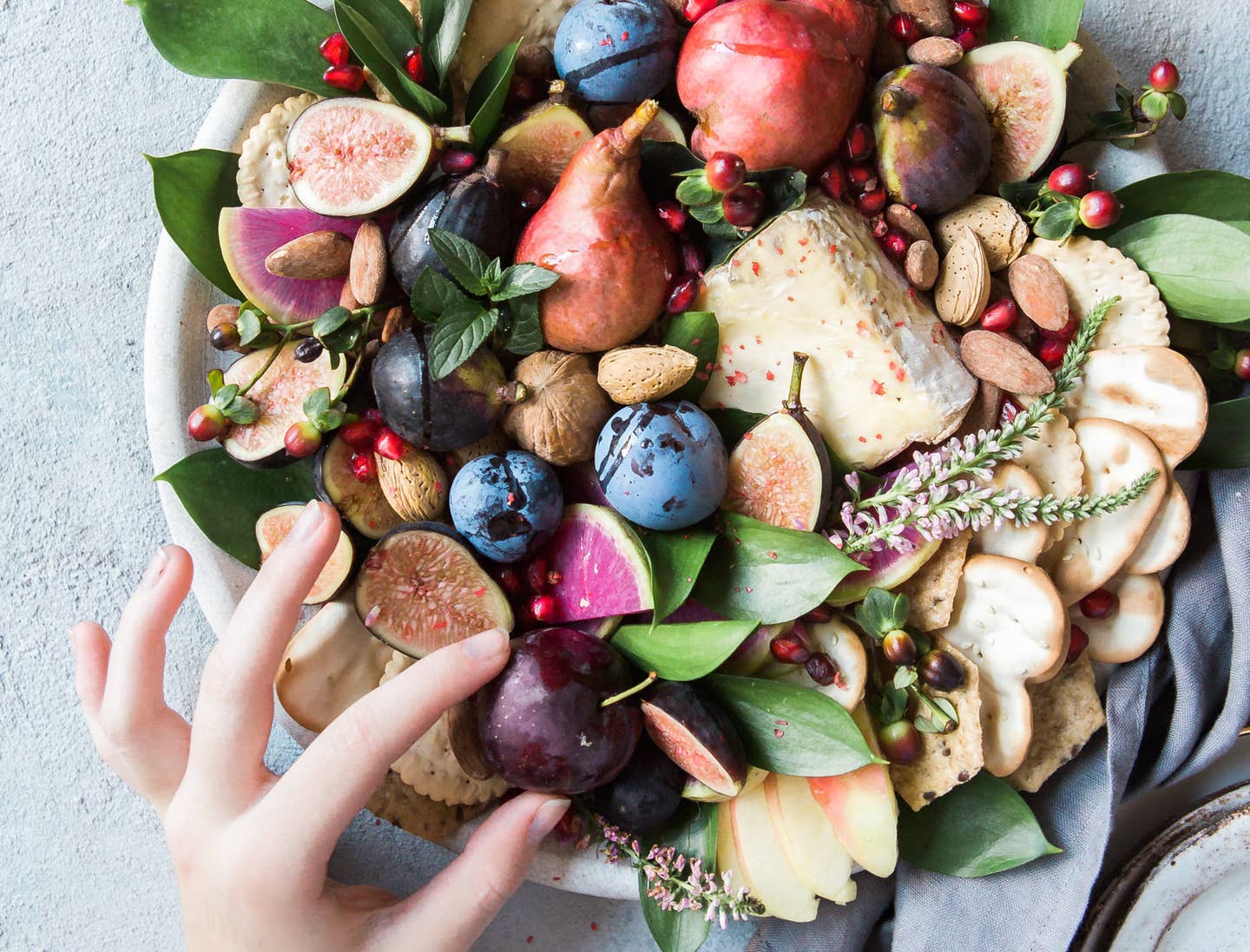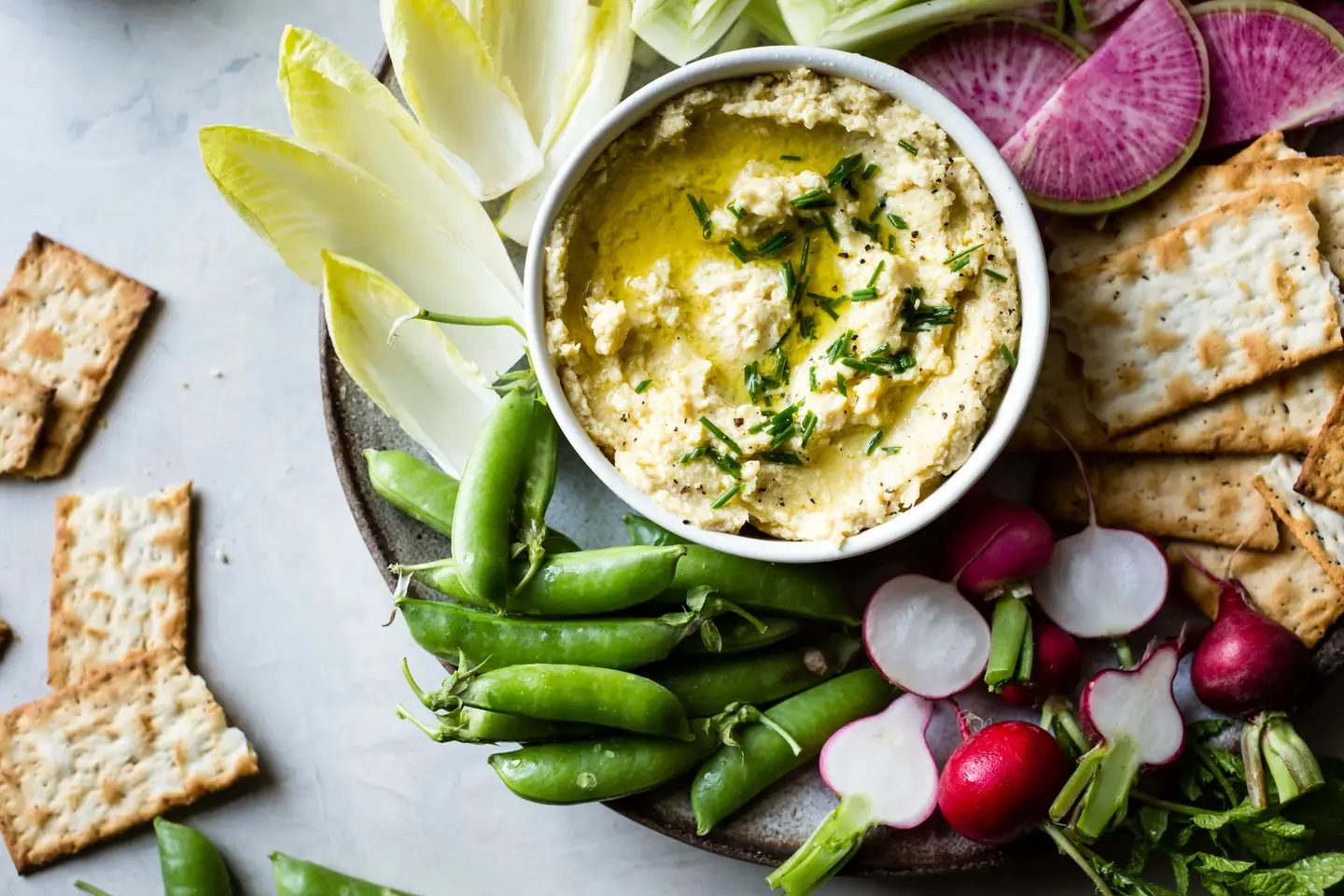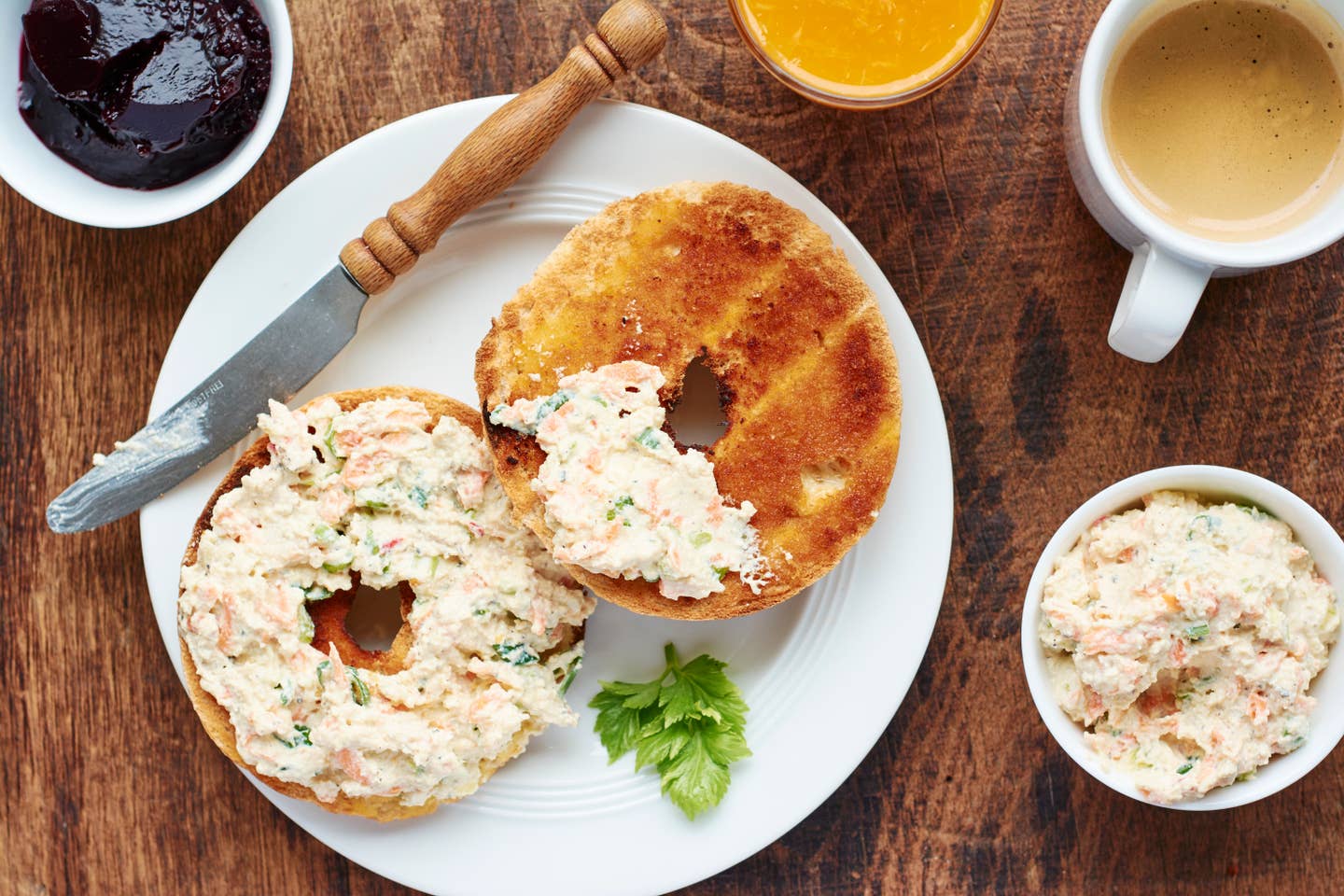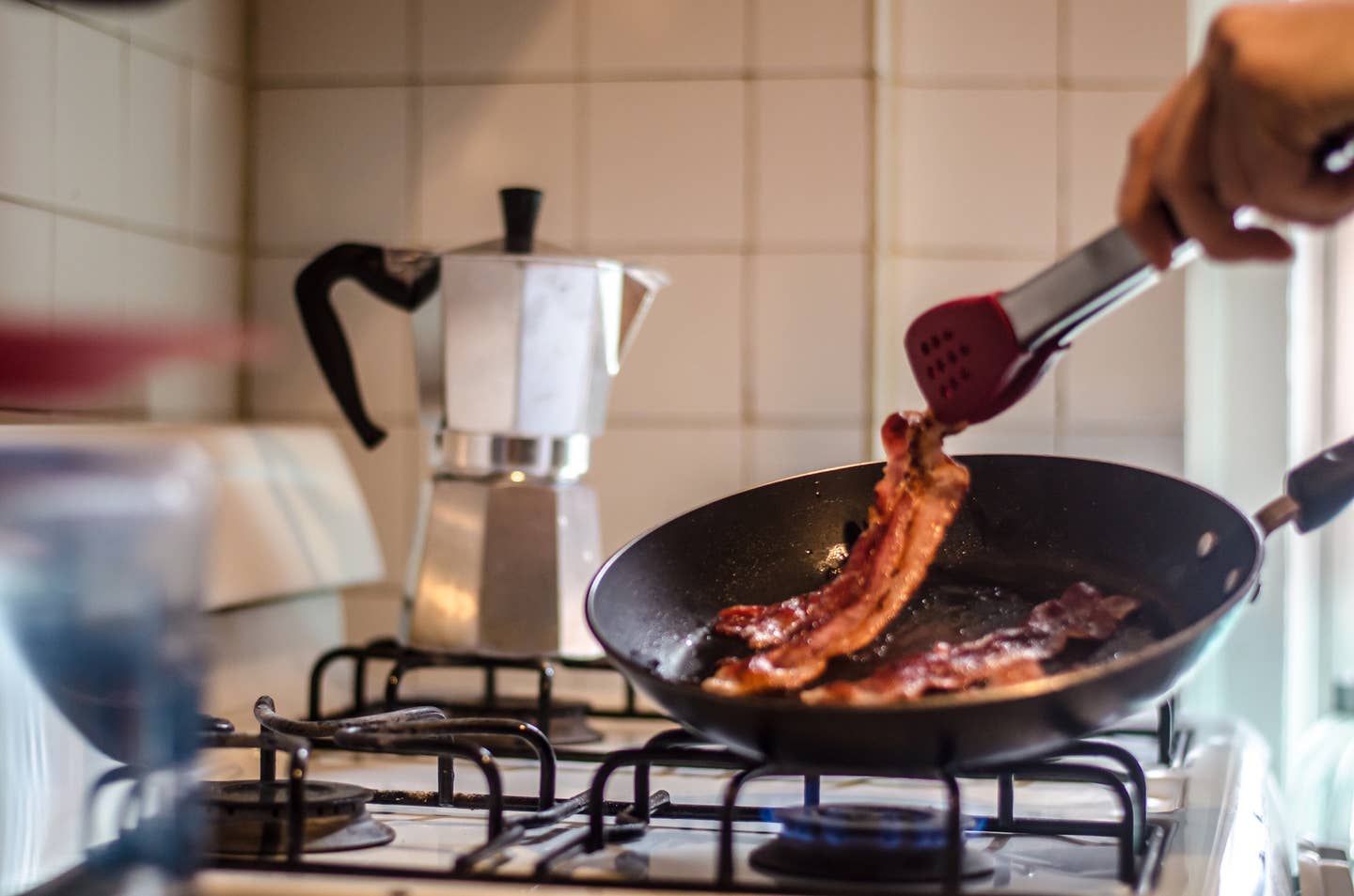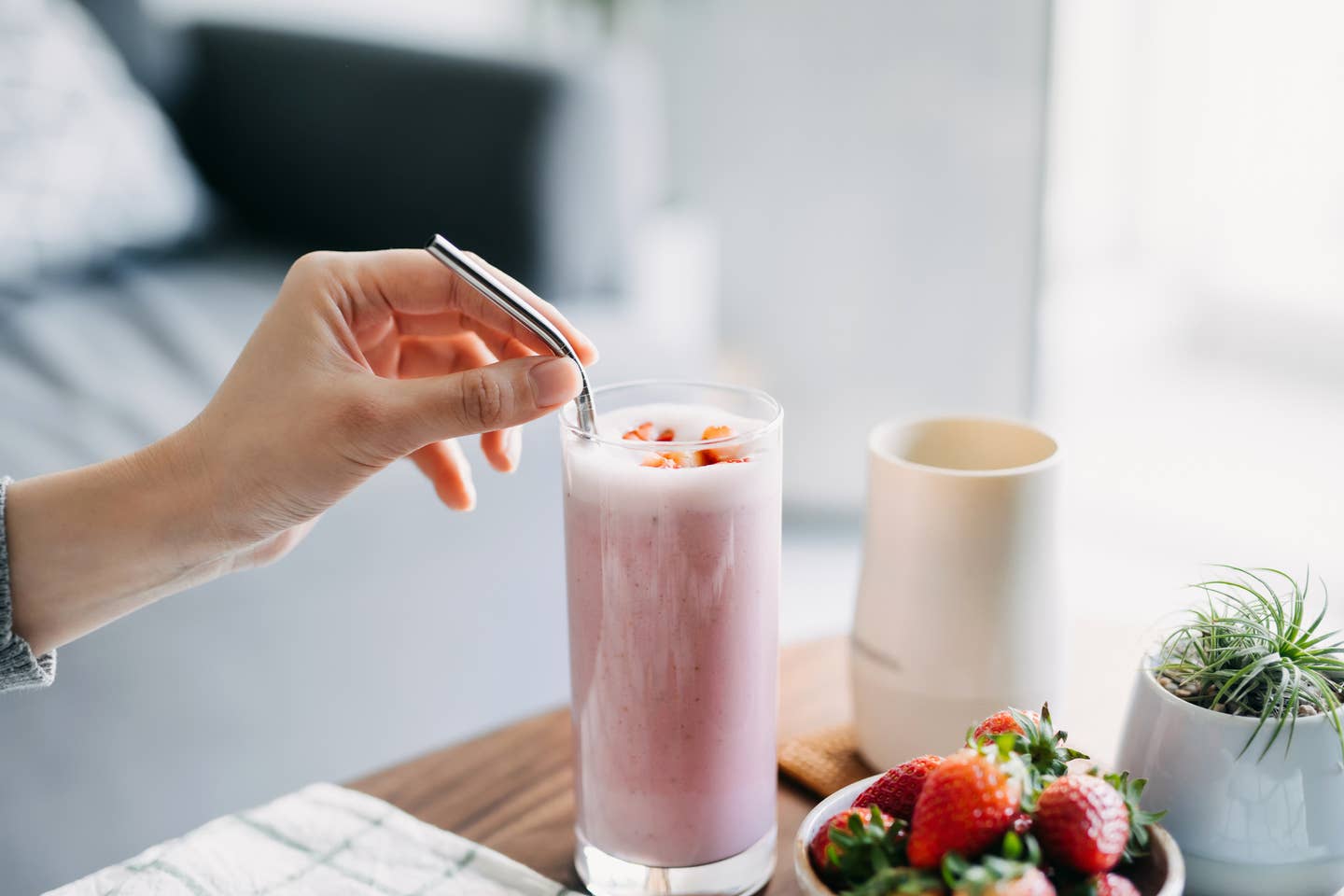
Your Guide to the Best Vegan Protein Powders. We Tasted 10 Bestsellers
When people go plant-based they suddenly become obsessed with where to get their protein. Whether you consider yourself an athlete or you're just trying to slim down, and whether you want to get leaner or build stronger muscles, protein powders can be your secret weapon. But they are not all created equal and with the huge selection of choices, it can be confusing to know what to buy.
First a note about protein sources. Traditionally protein powders are either whey or soy. But now there is an explosion of plant-based protein that includes blended sources from pea protein, hemp, and other clean plant foods.
You might not expect plant-based protein powders to be as effective as whey but that's not the case. Not only do these powders have tons of protein, but most of them also have cleaner ingredients. We picked powders with a high ratio of protein to carbs, to make sure that no matter what your goal, you'll get plenty of protein in every sip. For more on how to pick the right protein powder for you, check out The Beet's article on picking the best protein powders by a sports nutritionist. Here we tell you which ones taste great and offer the healthiest mix of benefits.
So you won't have to spend time or money searching for the best tasting plant-based protein powder, The Beet editors taste-tested 9 of the most popular powders. Not only are these expensive to buy -- some of them as much as $60 for a large canister -- but many of them are hard to swallow because of the chalky consistency. So we are only reviewing the ones we liked and would recommend.
We tell you which powders to mix with water, which ones are better when you add them to a smoothie and which are better mixed into your oatmeal. You can even add them o your pancake or muffin batter! All the powders are either soy, hemp, pea or rice-based. To be fair, we made sure the powders were all vanilla flavored to make it a level playing field. But often the chocolate or other flavors are actually tastier -- so it's up to you when purchasing.
For all the Beet Meters, check out the best vegan products.
Overall Winner: 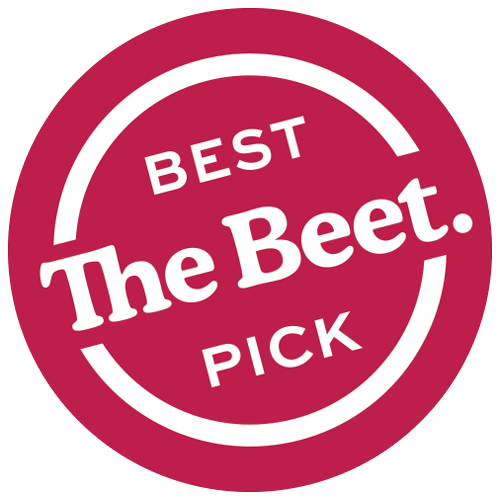
1.TB12 Vanilla Plant-Based Protein
Tom Brady's TB12 pea protein powder consists of simple ingredients with no additives. For anyone who is allergic to soy or nuts, TB12's pea protein-based powder is a great option. It's hard to say no to this powder with 24 grams of protein. Don't hide this powder in a smoothie, mix it with water and you will immediately see a thick consistency resembling a vanilla milkshake. Not only does it look like a milkshake, but it tastes like it too. TB12 recommends drinking this powder up to 20 minutes after a workout for the best recovery. You have to order this powder on the TB12 website since it isn't available in stores or on Amazon. Less than $2 per serving!

TB12 Vanilla Plant-Based Protein
GOAT Power
3.5
Health
5
Taste
Editor's Take
For anyone who is allergic to soy or nuts, TB12's pea protein-based powder is a great option. It's hard to say no to this powder with 24 grams of protein. Don't hide this powder in a smoothie, mix it with water and you will immediately see a thick consistency resembling a vanilla milkshake. Not only does it look like a milkshake, but it tastes like it too. Less than $2 per serving!
EXPERT RATING:
2. Momentous Absolute Zero
Momentous protein powder is a combination of pea and rice protein concentrate. Testers liked the initial scent of mint and thought it was refreshing. This powder is perfect for anyone who likes sweeter drinks. Momentous powders are NSF International Certified for Sport, which means the product label is 100% accurate and there are no banned substances present in this powder. This is one of the pricier protein powders at $60 a tub but is worth it for athletes looking for a clean and effective post-workout powder. We recommend either mixing with water or adding to a smoothie for a more nutrient-dense drink. The priciest powder of the bunch at $3 per serving.

Momentous Absolute Zero
Athlete Approved
3
Health
5
Taste
Editor's Take
Testers loved the initial scent of mint and said it was refreshing. This powder is perfect for anyone who likes slightly sweeter drinks. Momentous powders are Certified for Sport by the National Science Foundation, which means the product label is 100% accurate and there are no banned substances in this powder. The priciest powder of the bunch at $3 per serving.
EXPERT RATING:
3. Nuzest Clean Lean Protein
The name of this powder says it all. Nuzest is the cleanest protein powder since it is made out of only 3 simple ingredients: Pea protein isolate, natural vanilla flavor, and thaumatin (a low-calorie sweetener). For $45, you are supposed to get 20 servings out of one container, but at a glance that didn't seem accurate. This high protein, low carb powder is perfect to blend with plant-based milk and ice. The consistency is smooth and adds thickness to any protein shake.

Nuzest
Clean Protein
3.5
Health
4.5
Taste
Editor's Take
Nuzest is the cleanest protein powder since it is made out of only 3 simple ingredients: Pea protein isolate, natural vanilla flavor, and thaumatin (a low-calorie sweetener). This high protein, low carb powder is perfect to blend with plant-based milk and ice. The consistency is smooth and adds thickness to any protein shake.
EXPERT RATING:
4. Power Life By Tony Horton
Fitness guru Tony Horton has a new line of products under the Power Life brand and his protein powder tastes clean, light and drinkable, even without having to add it to a smoothie. Sip it for 15 grams of plant-based protein from a unique blend of Pumpkin, Sunflower and Flax seeds and Mung Beans. One note: Keep shaking or stirring it since the powder settles to the bottom of your water bottle in minutes, making the last sips taste a little grainy. It’s pricey at $70 for a 14-ounce container but with 90 calories this is a good choice for anyone trying to watch their weight.

Power Life High Impact Plant Protein
The Plant Life Style
3.5
Health
4.5
Taste
Editor's Take
Fitness guru Tony Horton has a new line of products under the Power Life brand and his protein powder tastes clean, light and drinkable even without having to add it to a smoothie. Sip it for 15 grams of plant-based protein from a unique blend of Pumpkin, Sunflower and Flax seeds and Mung Beans. One note: Keep shaking or staring it since the powder settles to the bottom of your water bottle in minutes. It’s pricey at $70 for a 14-ounce container but with 90 calories this is a good choice for anyone trying to watch their weight.
EXPERT RATING:
5. Garden of Life
Garden of Life is made of pea, buckwheat, amaranth sprout, and brown rice. We didn't love the green color of the powder or the way it smelled but once we mixed it with water, it tasted surprisingly good. Garden of Life is the easiest to mix with water, plan-based milk or in a smoothie. The vanilla flavor isn't overpowering so you can add this to any combination of smoothies and not be overwhelmed by the taste of vanilla. And it's only $1.20 per scoop!

Garden of Life Protein & Greens
Great Greens
4
Health
4.5
Taste
Editor's Take
We didn't love the green color of the powder or the way it smelled but once we mixed it with water, it tasted surprisingly good. Garden of Life disolves easily into water, plant-based milk or a smoothie. The vanilla flavor is mild, so you can add it to any combination of smoothies and not be overwhelmed by the taste of vanilla. And it's only $1.20 per scoop!
EXPERT RATING:
6. Tone It Up Plant-Based Protein Vanilla
Tone It Up protein powder is a blend of sunflower seeds and pea protein. The minute we opened the container, everyone loved the smell of this powder. Tone It Up is known to be a great addition to baked goods. The next time you make your protein muffins, add Tone It Up to the mix. We don't suggest adding this powder with just water but instead a smoothie with fruits and veggies.

Tone It Up Protein Powder
The TIU Girls' Secret Weapon
4
Health
4.5
Taste
Editor's Take
The minute we opened the container in the office, everyone loved the smell of this powder. Tone It Up protein powder is a great addition to your baked goods. The next time you make your favorite protein muffins, add TIU powder to the mix. We don't suggest adding it to water because of the strong taste but it's great in a smoothie with fruits and veggies.
EXPERT RATING:
7. Elevate Plant-Based Performance Protein
Elevate is a pea and hemp protein-based powder that also is made with sweet potato powder. For anyone looking to convert from whey protein powders, Elevate is the plant-based protein for you. This powder is meant to be used in beverages such as smoothies. The thin consistency doesn't mix well with water and becomes chalky. If you aren't in the mood for a protein smoothie, add a scoop to your pancake batter. For a complete recipe check out Elevate's Chocolate Chip Banana Protein Pancakes. This powder is another affordable choice at $1.60 a scoop.

Elevate Plant-Based Performance Protein
Elevate Your Protein
3.5
Health
4
Taste
Editor's Take
For anyone looking to convert from whey protein powders, Elevate is the plant-based protein for you. It's the most similar to whey powders in that the thin consistency is easy to dissolve into water. If you aren't in the mood for a protein smoothie, add a scoop to your pancake batter. This powder is another affordable choice at $1.60 a scoop.
EXPERT RATING:
8. Vega Protein & Greens
The base of Vega is pea protein, brown rice protein, and sacha inchi (a seed eaten like a nut) protein. One serving of Vega has only 80 calories and 15g of protein. Vega's protein powder is a great choice for anyone who struggles to get enough greens in their diet. The proteins are combined with alfalfa powder, spinach powder, broccoli powder, and organic kale powder giving you 2 servings of veggies in one scoop. The taste of this protein was described as "artificial" whereas others thought it tasted like birthday cake. We recommend adding this into a smoothie, but luckily all you have to add is fruit since Vega has the greens covered. This low-cal powder won't break the bank at $1.20 a scoop.

Vega Protein & Greens
Vega, Baby!
3
Health
4
Taste
Editor's Take
One serving of Vega has only 80 calories and 15g of protein. Vega's protein powder is a great choice for anyone who struggles to get enough greens in their diet, with 2 servings of veggies in one scoop. The taste of this protein was described as "artificial" whereas others thought it tasted like birthday cake. This low-cal powder won't break the bank at $1.20 a scoop.
EXPERT RATING:
9. Vivo Perform
Vivo Perform is the most superfood-packed protein powder of this bunch. Athletes will appreciate this protein powder made of pea protein, hemp protein, plant-based BCAA (branched-chain amino acids), reishi mushrooms, acai berries, lucuma fruit powder, maca powder, and turmeric extract. Vivo Perform is $59 on Amazon so go straight to their website for a cheaper price at $51 for the pouch pictured below.
With 25g of protein and a complete amino acid profile helps athletes to build, perform, recover, and absorb. If you want a quick protein drink after a workout, use a shaker bottle when mixing or this powder will stick to the sides of the cup. In the mood for a protein-filled breakfast? Add to your oatmeal or smoothie bowl with this recipe.

Vivo Life Perform
Athlete-Approved
3
Health
4
Taste
Editor's Take
Athletes will appreciate Vivo Perform made of pea protein, hemp protein, plant-based BCAA (branched-chain amino acids), reishi mushrooms, acai berries, lucuma fruit powder, maca powder, and turmeric extract. With 25g of protein and complete amino acid profile helps athletes to build, perform, recover, and absorb.
EXPERT RATING:
10. PlantFusion Complete Protein
PlantFusion is a blend of peas, artichokes, algae, and superfoods. The deep yellow-gold coloring of PlantFusion's protein powder set this brand apart from the rest. Some testers found the flavor wasn't overwhelming, making it a great addition to a smoothie, whereas others felt the powder was sweet. For those of you who aren't a fan of Stevia, buy the natural, no-stevia blend. This protein powder is low in fat, and carbs, making it a great choice for anyone wanting to lose weight while still getting enough protein (21g a serving). PlantFusion's powder has a sweetness not everyone enjoyed since Stevia is an ingredient. $1.20 a scoop, makes this a deal!

PlantFusion Complete Plant Based Pea Protein
The Power of Fusion
3
Health
3.5
Taste
Editor's Take
PlantFusion is a blend of peas, artichokes, algae, and superfoods. PlantFusion's powder has a sweetness not everyone enjoyed since Stevia is an ingredient. For those of you who aren't a fan of Stevia, buy the natural, no-stevia blend. This protein powder is low in fat and carbs, making it a great choice for anyone wanting to lose weight while still getting enough protein (21g a serving). $1.20 a scoop, makes this a deal!
EXPERT RATING:
Top 10 Sources of Plant-Based Protein According to a Nutritionist
1. Seitan
Protein: 21 grams in ⅓ cup (1 ounce) Seitan isn’t as popular as other proteins, but it should be! Made from wheat gluten, its texture resembles ground meat. It’s often used in pre-made veggie burgers or meatless nuggets. Seitan has a savory taste, like mushrooms or chicken, so it works well in dishes that call for an umami flavor. With a hearty texture, seitan can be the star of practically any vegan main dish. Add it to stir-fries, sandwiches, burritos, burgers, or stews. Like tofu, seitan will take on the flavor of any marinade or sauce.
2. Tempeh
Protein: 16 grams in 3 ounces If you like a protein with a bit of bite, add tempeh to your list. Made from fermented soybeans, tempeh has a slightly nutty flavor and is pressed into a block. Most varieties include some sort of grains, such as barley or millet. Not only is tempeh a plant-based source of protein, but the fermentation process also creates good-for-your-gut probiotics. You can cut tempeh right off the block and use it as the base for a sandwich or pan-fry it with some sauce. Or, crumble, heat, and make it the star of your next taco night.
3. Lentils
Protein: 13 grams in ½ cup cooked Lentils come in multiple varieties--red, yellow, green, brown, black. Regardless of the type lentils are small but mighty nutritional powerhouses. They pack a good amount of protein as well as iron, folate, and fiber. When cooked, brown lentils retain their texture and can be the base for a grain bowl or make a hearty substitute for ground meat in meatballs, lasagna, tacos or Bolognese. Red lentils are a bit softer and make a nice add-in for a hearty soup, chili, or stew.
4. Hemp Seeds
Protein: 10 grams in 3 tablespoons Hemp seeds are a tender and nutty seed, derived from the hemp plant. They contain good amounts of omega-3s, iron, folate, magnesium, phosphorus, and manganese. They are also a solid source of both soluble and insoluble fiber, which helps to keep your digestive tract healthy and humming. Because they pack a double whammy of protein and healthy fats, hemp seeds can help satisfy hunger, preventing those embarrassing stomach growls as you slog your way to your lunch break. Add them to your morning smoothie or sprinkle them on top of yogurt, oatmeal, or even a salad.
5. Tofu
Protein: 9 grams in 3 ounces (⅕ of a block) Made from coagulated soybeans, tofu is the most popular plant-based protein. Soy is one of the only meatless "complete" proteins, meaning that it contains all of the essential amino acids that the body can’t make but needs for muscle and immune function. With 15% of your daily calcium needs, tofu is also a good replacement for dairy.
6. Edamame
Protein: 9 grams of protein in ½ cup This sushi appetizer is a nutrient powerhouse, so eat it anytime. Edamame is really just another name for soybeans in their pods. Let’s list off some stats--a small ½-cup serving of edamame has 9 grams of protein, 15% of your daily vitamin C, 10% of your daily iron and 16% of your daily fiber. Keep a bag of edamame in your freezer to serve as a fun-to-eat side dish or opt for the shelled variety to toss into salads or a grain bowl.
7. Quinoa
Protein: 8 grams per cup (cooked) Quinoa is an ancient grain and since it's gluten-free a great choice for anyone avoiding gluten. Add it to your burger recipe to create filling texture, or instead of meat in your taco or burrito. Quinoa is among the healthiest foods on the planet, delivering phytonutrients that have anti-inflammatory qualities, so keep it in your pantry for any meal that needs a filling grain. Just remember to soak it and rinse before cooking to get rid of any bitter taste.
8. Black Beans
Protein: 7 grams in ½ cup (canned) Eating beans on the regular might as well be a prerequisite for a plant-based diet. Not only are canned black beans inexpensive, but they also contribute 10% of your daily iron and 25% of your daily fiber to your diet. For less than $1 a can, beans can be the star of tacos, quesadillas, salads, soups, burgers, or dips.
9. Amaranth
Protein: 6 grams in ⅔ cup (cooked) Chances are you’ve never cooked amaranth. But you should, since this tiny, gluten- free grain is packed with almost 30% of your daily fiber and 20% of your daily iron. Cook it like a traditional grain to yield a soft, porridge-like texture. Many people add amaranth to other a hot breakfast cereal mixture, like oats and quinoa. It also pops like popcorn. Toss it in a pot with some oil and wait for it to pop up into a nutritious snack.
10. Peas
Protein: 5 grams in ⅔ cup If peas were one of your most hated veggies as a kid, it’s time to give them another chance. These green beans are a great low-calorie protein to keep in your freezer. Sure, they don’t always taste great when steamed or microwaved (who wants to eat mushy, overcooked peas?), but they do blend well into a yummy puree that can be slathered on toast. To amp up the flavor, add some lemon juice or mint to your mix before you blend.
The Top 20 Veggies with the Most Protein
1. Soy Beans
Soybeans are a legume but they are such a great source of protein that we had to lead the veggie list with it. There is more protein in just one ounce of soybeans than a cup of sliced avocado! 1 cup equals Protein - 28.6g Calories - 298 Carbs - 17.1g Fiber - 10.3g Calcium - 175mg
2. Peas
If the pod, that peas are grown in, is split down the middle, that is an indicator they are ripe. Seeds inside the pod vary and can be green, white or yellow. 1 cup equals Protein - 8.6g Calories - 134 Carbs - 25g Fiber - 8.8g Calcium - 43.2 mg
3. Corn
Fresh corn is a great source of energy for those who like to stay active. Protein isn't all that corn has to offer. Corn provides the body with potassium and B vitamins. 1 cup equals Protein - 5.4g Calories - 177 Carbs - 123g Fiber - 4.6g Calcium - 4.9mg
4. Artichoke Hearts
Artichokes are part of the sunflower family. The fiber in artichoke hearts is great for supporting digestion. 1 cup equals Protein - 4.8g Calories - 89 Carbs - 20g Fiber - 14.4g Calcium - 35.2mg
5. Asparagus
If not properly stored, Asparagus tends to go bad quickly, To elongate freshness, put damp paper towels around the stems, or place the entire asparagus bunch in a cup of water (like flowers) to maintain freshness longer. 1 cup equals Protein - 4.4g Calories - 39.6 Carbs - 7.4g Fiber - 3.6g Calcium - 41.4mg
6. Brussel Sprouts
Brussel sprouts have more Vitamin C than an orange. If your Brussel sprouts have a rancid odor that is an indicator you overcooked them. The smell occurs because the sprouts are composed of a great amount of sulforaphane. 1 cup equals Protein - 4g Calories - 56.2 Carbs - 40g Fiber - 4g Calcium - 56.2mg
7. Broccoli
If you are trying to lose weight broccoli is a great addition to your diet because it consists of 90 water and is also high in fiber. 1 cup (chopped) equals Protein - 3.8g Calories - 54.6Carbs - 11.2g Fiber - 5.2g Calcium - 62.4mg
8. Mustard Greens
Mustard greens provide the body with tons of Vitamin A, Vitamin C, Vitamin K and fiber. Adding steamed mustard greens into your diet has been known to lower cholesterol and reduce inflammation. 1 cup equals Protein - 3.2 g Calories - 21 Carbs - 2.9g Fiber - 2.8g Calcium - 104mg
9. Avocado
Avocado is commonly mistaken as a vegetable but it is technically a fruit. This fruit had to be included in our veggie list because it isn't just tasty but super nutritious. Avocados are packed with protein but they are a great source of potassium and fiber. Avocados are a great addition to any salad, sandwich and even smoothie! 1 cup equals Protein - 3.0 g Calories - 240 Carbs - 12.8 g Fiber - 10.1g Calcium - 18 mg
Onions are an unappreciated food hero since they provide 20 percent of your daily Vitamin C and deliver an abundance of antioxidants that can reduce inflammation. 1 cup (chopped) equals Protein - 2.9g Calories - 92.4 Carbs - 21.3g Fiber - 2.9g Calcium - 46.2mg
11. Beets
The entire beetroot is edible including the leaves which contain loads of vitamin A, calcium, iron and potassium. Beetroot is high in sugar but is considered one of the most nutritious veggies used in salads and soups. 1 cup equals Protein - 2.8 g Calories - 74.8 Carbs - 17g Fiber - 3.4g Calcium - 27.2mg
12. Oyster Mushrooms
Oyster mushrooms are commonly seen in Chinese dishes. They grow best in a controlled environment indoors. Oyster mushrooms have so many nutrients to offer besides protein such as iron, calcium, zinc and folic acid. 1 cup (raw and sliced) equals Protein - 2.8g Calories - 37 Carbs - 5.6g Fiber - 2.0g Calcium - 2.6mg
13. Bok Choy
Bok Choy is a member of the mustard family. One of the oldest cultivated vegetables in the world, Bok Choy means "white vegetable” and is a great source of vitamins A, C, B6, K, and E, magnesium, potassium, iron, manganese, and calcium. 1 cup equals Protein - 2.7 g Calories - 20.4 Carbs - 3.1g Fiber - 1.7g Calcium - 158mg
14. Green Beans
Green beans are a great source of vitamins B, C and K, and minerals such as magnesium, iron and manganese. Green beans should be cooked before eating, to destroy lectins. China is the biggest grower of green beans in the world, exporting over 15 million tons a year. 1 cup equals Protein - 1.8 g Calories - 31 Carbs - 7 g Fiber - 2.7 g Calcium - 37 mg
15. Cauliflower
The most nutritious way to consume cauliflower is steamed. Don't get intimidated by orange, purple or green cauliflower. All three types have the same benefits as white cauliflower. 1 cup equals Protein - 2.2g Calories - 28.6 Carbs - 5.4g Fiber - 2.8g Calcium - 19.8mg
16. Turnip
You can eat the entire plant, root and leaves. The turnip root is high in vitamin C and the greens are high in vitamins A, C, E, B6 and K, believed to counter inflammation. Add turnip roots to soup, or mash them. Add them to salads. 1 cup equals Protein - 1.6g Calories - 28.8 Carbs - 6.3g Fiber - 5.0g Calcium - 197mg
17. Alfalfa Sprouts
Alfalfa sprouts might be little but they sure are powerful. Plus they're quick and easy to grow. They are loaded with Vitamin C, Vitamin K, Iron and more. But because they have been known to carry bacteria, make sure to fully cook alfalfa sprouts if you have a fragile immune system or are pregnant. 1 cup equals Protein - 1.3 g Calories - 8 Carbs - 0.7 g Fiber - 0.6 g Calcium - 10.6 mg
18. Tomatoes
Keep your tomatoes fresher for longer by storing them stem down. When exposed to sunlight the Vitamin C in a tomato will diminish. 1 cup equals Protein - 1.3g Calories - 26.8 Carbs - 5.8g Fiber - 1.8g Calcium - 14.9mg
19. Zucchini
Zucchini has an abundance of potassium, even more than a banana! The reason zucchini isn't high in calories is that it is made up of 95% water. 1 cup equals Protein - 1.2g Calories - 28.8 Carbs - 7.1g Fiber - 2.5g Calcium - 23.4 mg
20. Spinach
Spinach is filled with Vitamin A, Vitamin E, Vitamin K, fiber and protein. The best part about spinach is you can sauté it, blend it or eat it raw! Spinach is best grown in rainy and cool weather. 1 cup equals Protein - 0.9g Calories - 6.4 Carbs - 1.0 g Fiber - 0.6g Calcium - 27.7 mg
Top 15 Legumes and Beans
1. Soy Beans
Soybeans are a legume but they are such a great source of protein that we had to lead the veggie list with it. There is more protein in just one ounce of soybeans than a cup of sliced avocado! 1 cup equals Protein - 28.6g Calories - 298 Carbs - 17.1g Fiber - 10.3g Calcium - 175mg
2. Lentils
Lentils are the only beans that don't have to be soaked before preparing. Lentils can be the star of any dish that needs heft, from soups to burgers. Next time it's Taco Tuesday, try out lentil tacos—they pack a protein punch. 1 cup equals Protein - 17.9 g Calories - 230 Carbs - 39.9 g Fiber - 15.6 g Calcium - 37.6 mg
3. White Beans
Dried white beans can be stored for up to three years in a dry, room-temperature location. Which means you can keep them around whenever you need a staple for soups or stews. 1 cup equals Protein - 17.4 g Calories - 249 Carbs - 44.9 g Fiber -11.3 g Calcium - 161 mg
4. Edamame
Edamame is a great snack to keep in your freezer. Microwave them and spice them up with a sprinkle of salt, chili powder and red pepper flakes. You'll be enjoying a protein-filled snack that is better than chips. 1 cup (cooked and shelled) equals Protein - 16.9 g Calories - 189 Carbs - 15.8g Fiber - 8.1g Calcium - 97.6mg
5. Cranberry Beans
As you cook cranberry beans, the unique specks of red that give these legumes their name vanish. Boil the cranberry beans, blend into a spread and use as a delicious dip with veggies for a great protein snack. 1 cup equals Protein - 16.5 g Calories - 241 Carbs - 43.3 g Fiber - 15.2 g Calcium - 88.5 mg
6. Split Peas
Don't confuse split peas with green peas. Split peas are dried and—surprise— split. Unlike their sweet cousins, these peas must be boiled for 45 minutes before they're ready to eat. Make Ina Garten's easy Parker's Split Pea Soup for a protein-packed lunch. 1 cup cooked Protein - 16.3 g Calories - 229 Carbs - 41.1 g Fiber - 16.3 g Calcium - 27.4 mg
7. Kidney Beans
Make sure to soak these beans overnight to get rid of the toxic proteins in the raw bean that is harmful to people and animals. then cook thoroughly before eating. Soaking and cooking the beans will get rid of the harmful proteins. Then, dig in! 1 cup equals Protein - 15.3 g Calories - 225 Carbs - 40.4 g Fiber - 13.1 g Calcium - 49.6 mg
8. Black Beans
Black "turtle" bean is the technical name for this crowd favorite. The "turtle" part comes from the physical appearance of the shiny exterior shell that protects the bean. 1 cup equals Protein - 15.2 g Calories - 227 Carbs - 40.8 g Fiber - 15 g Calcium - 46.4 mg
9. Navy Beans
As you can see, navy beans are clearly not navy. So where did the name come from? These beans were such an important part of the U.S. Navy diet in the beginning of the 20th century that the beans were named after them. Anchors aweigh! 1 cup equals Protein - 15 g Calories - 255 Carbs - 47.4 g Calcium - 126 mg
10. Pinto Beans
Canned pinto beans aren't just a source of protein, but also major fiber. Pinto beans are often used as refried beans because they fall apart when steamed. 1 cup equals Protein - 15.4g Calories - 245 Carbs - 44.8g Fiber - 15.4g Calcium - 78.6mg
11. Chickpeas
What's better than hummus for boosting protein? Not much. Just half a cup delivers 10 grams of protein, which is a good percentage of your daily needs: ranging from 45 to 65 grams, depending on weight, gender and activity level. 1 cup equals Protein - 14.5g Calories - 269 Carbs - 45g Fiber - 12.5 g Calcium - 80.4 mg
12. Lima Beans
Lima beans are often called "butter beans" because of their buttery taste. Famously used in succotash, lima beans can also be used boost the taste of a hearty vegetable soup, or roast them with sweet potatoes as a side dish. 1 cup equals Protein - 14.7 g Calories - 216 Carbs - 39.3g Fiber - 13.2g Calcium - 32mg
13. Mung Beans
Mung beans lack a lot of flavor but are great to add to any dish for crunch and protein. Trade your chickpea-based falafel for a mung bean option to switch things up. Fact: Just Eggs uses mung beans for protein! 1 cup equals Protein - 14.2 g Calories - 212 Carbs - 38.7 g Fiber - 15.4 g Calcium - 54.5 mg
14. Fava Beans
Take the fava beans out of the pod since experts don't recommend eating that part. For freshest taste, only separate the beans from the pods when you 're ready to eat them. 1 cup equals Protein - 12.9 g Calories - 185 Carbs - 33.2 g Fiber - 9.18 g Calcium - 61.2 mg
15. Peas
Who knew little old peas pack a major protein punch? One cup of peas has more protein than one average-sized egg. Yep, you can make a bet and win it. 1 cup equals Protein - 8.6g Calories - 134 Carbs - 25g Fiber - 8.8 g Calcium - 43.2 mg
More From The Beet
